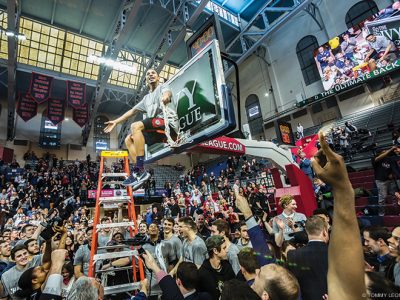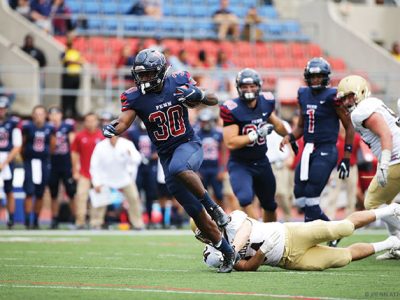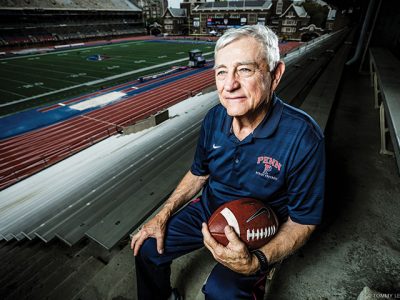The 56-year championship drought ended appropriately: In the closing minutes of the season-ending finale — a 46-14 pasting of the Princeton Tigers — Penn’s 1996 lightweight football team celebrated its first Eastern Lightweight Football League (ELFL) title since 1940 by emptying a bucket of ice water on coach Bill Wagner. The championship was the first for Wagner in his 26 years at the helm of the Quakers, who finished with a 5-1 record, tied for the league lead with perennial powers Army and Navy.
“When this year started out, no one expected us to do anything, but we turned it all around,” said Wagner, who also serves as pitching coach for Penn’s baseball team. “Every player, from the first guy on the team to the last, worked really hard all year. It was one of the fastest seasons I can remember. It went by too quickly.”
The
titles and the victories, however, have always been secondary in the
minds of the players, who have treasured the unexpected opportunity to
resume their football-playing days in college. Begun in 1934 after Dr.
Thomas Sovereign Gates, president of the University from 1930-1944,
proposed “football for all,” lightweight football remains a sport at
only five schools: Army, Navy, Cornell University, Penn, and Princeton.
The sport is limited to those who weigh less than 165 pounds.
“Lightweight
football is the most amateur sport in America,” says Wagner, using the
original meaning of the word, which comes from the Latin “to love.”
“Guys are not coming to Penn to play lightweight football; they are not
recruited. More than half of the team hears about it after they get
here. They all came to Penn for the academics, and they are playing
because they love the game. They all make sacrifices and become
successful as graduates, and they give back to the program. That is what
has kept me here 26 years.”
The leader of the 1996 Quakers, senior wide receiver and punt-returner Clint Schmidt, W’97, typified
this enthusiasm. Schmidt never played high-school football at Omaha’s
Creighton Prep because of his size, but when a freshman hallmate at Penn
saw a flyer advertising “lightweight football,” he jumped at the
chance. By the second game of the 1996 season, he had eclipsed the
Quakers’ previous record for career receiving-yardage of 555 yards; he
finished his career with 760 yards. In Penn’s dramatic 16-13 overtime
victory against Army, the first win over the Cadets in Wagner’s tenure,
Schmidt scored two touchdowns, one on a dazzling 84-yard punt return.
For
his efforts, Schmidt was honored as the Most Valuable Player of the
ELFL, and he was named to the all-ELFL team for the fourth consecutive
year. He also received the Lt. Charles Schmucker Ideal Lightweight
Football Player award, which is presented to Penn’s most outstanding
player in honor of Schmucker, who was killed in the Korean War after a
stellar career as running back
and punt-returner on the Quakers’ 1947-1949 lightweight teams.
Schmidt
was not the lone star of the championship team. After the Quakers’ only
loss of the season, to Navy, they clawed their way back to a thrilling
24-21 double-overtime victory against Cornell. Dan Malasky, C’97,
booted a 42-yard field goal, and on Cornell’s overtime possession, the
Penn defense recovered a fumble to officially end the game.
Army’s
defeat of Navy, the day before the Penn-Princeton game, set up the
opportunity for a three-way tie for the ELFL title. Before the game, the
players had a talk among themselves. “We talked about Coach Wagner
before the game,” says Schmidt. “We wanted to win a title for him. The
man deserves it.” The fired-up Quakers then went out and drove to a
33-14 halftime lead, which all but ensured a share of the title.
In the off-season, the program will use a $50,000 donation from General Felix Santoni, W’55,
to renovate the lightweight football locker room and to bolster an
endowment fund. Santoni never played lightweight football at Penn, but
his son-in-law, Dan Doheny, C’85, was a masterful offensive
lineman. Santoni is donating the money in memory of Doheny, who died two
years ago. In addition, the Dan Doheny award, which was presented to
sophomore Neil Batiancila, C’99, this year, is given annually to the team’s best lineman.
The players develop a fierce loyalty to the program, and many continue to support the team long after they’ve graduated. “I loved to play a game that was pure sport, without the pressure of big-time football,” says Harry Rothstein, W’43, a lineman on the 1940 championship team. “That sport was the most fun of any athletic sport I played. I feel I owe a little bit back.”




